|
|
|
Sort Order |
|
|
|
Items / Page
|
|
|
|
|
|
|
| Srl | Item |
| 1 |
ID:
177521
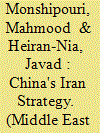

|
|
|
|
|
| Summary/Abstract |
This paper seeks to unpack China's grand energy policy in the Middle East. It examines the proposed Iran-China deal, to which China's great game in Iran presents new challenges. Beijing sees Iran as a key potential asset in Western Asia. Regional experts argue that, given Iran's extensive natural resources and human capital, as well as a relatively untapped market, the country is seen by the Chinese ruling class as a potentially valuable ally. Uncertainty, pessimism, and a deeply rooted culture of resistance against foreign influence and intervention help explain why skepticism about this deal is so pervasive in Iran. A closer look at Iran's history also illustrates that the country's interests would likely be more effectively served if it diversified its economic and political relations with both the West and the East, thus allowing the government to balance its relationship with those countries while retaining a degree of political independence.
|
|
|
|
|
|
|
|
|
|
|
|
|
|
|
|
| 2 |
ID:
050297
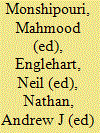

|
|
|
|
|
| Publication |
Armonk, M. E. Sharpe, 2003.
|
| Description |
xxxiii, 353p.
|
| Series |
International relations in constructed world
|
| Standard Number |
0765611376
|
|
|
|
|
|
|
|
|
|
|
|
Copies: C:1/I:0,R:0,Q:0
Circulation
| Accession# | Call# | Current Location | Status | Policy | Location |
| 047541 | 323/MON 047541 | Main | On Shelf | General | |
|
|
|
|
| 3 |
ID:
005310
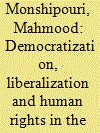

|
|
|
|
|
| Publication |
Boulder, Lynne Rienner Publishers, 1995.
|
| Description |
xv, 193p.
|
| Standard Number |
1555875297
|
|
|
|
|
|
|
|
|
|
|
|
Copies: C:1/I:0,R:0,Q:0
Circulation
| Accession# | Call# | Current Location | Status | Policy | Location |
| 036534 | 320.91724/MON 036534 | Main | On Shelf | General | |
|
|
|
|
| 4 |
ID:
126926


|
|
|
| 5 |
ID:
098891
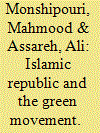

|
|
|
|
|
| Publication |
2009.
|
| Summary/Abstract |
Dr. Monshipouri is an associate professor of international relations at San Francisco state University. He is the author, most recently, of Muslims in global politics: Identites, interests and human rights.Mr. Assareh is specializing in international law at New York University School of Law.
|
|
|
|
|
|
|
|
|
|
|
|
|
|
|
|
| 6 |
ID:
049538


|
|
|
|
|
| Publication |
Boulder, Lynne Rienner Publishers, 1998.
|
| Description |
xi, 259p.
|
| Standard Number |
1555877826
|
|
|
|
|
|
|
|
|
|
|
|
Copies: C:1/I:0,R:0,Q:0
Circulation
| Accession# | Call# | Current Location | Status | Policy | Location |
| 040307 | 323.0956/MON 040307 | Main | On Shelf | General | |
|
|
|
|
| 7 |
ID:
169605
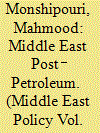

|
|
|
|
|
| Summary/Abstract |
Envisioning a post‐oil era leaves an ominous uncertainty hanging over the ruling elites in the Middle East and North Africa (MENA), particularly in the oil‐exporting countries. What is the proper strategy for a transition to a more reliable and sustainable economy? While the resource curse is widely regarded as having contributed to the underdevelopment of the region, recent studies demonstrate that oil wealth in and of itself provides a less compelling explanation for economic decline. Oil wealth does not necessarily weaken state institutions; rather, a rentier economy requires governments to perform remarkably well in order to effectively manage financial gains.1 What will happen to “the viability of these countries if they can no longer rely on oil and gas exports, or if they run out?”2 The global trend toward alternatives to fossil fuels is likely to undermine oil‐dependent MENA economies, and many countries have come to realize that the move to low‐carbon‐emission energy sources is inevitable.
|
|
|
|
|
|
|
|
|
|
|
|
|
|
|
|
|
|
|
|
|